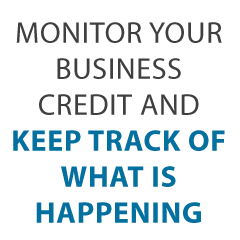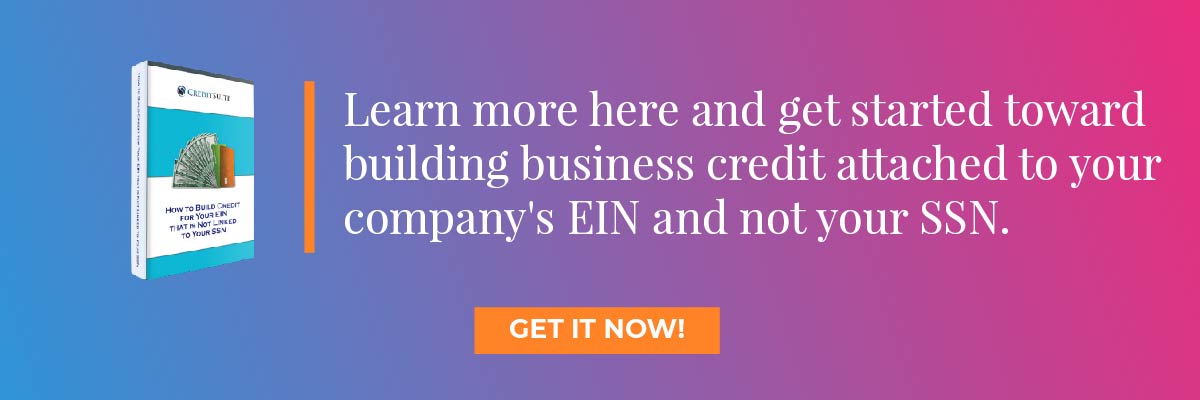- Connect With Us!
- (877) 600-2487
- info@creditsuite.com
How to Establish a Business Credit Score
Published By Janet Gershen-Siegel at October 25th, 2017
Establish a Business Credit Score Today – We Show You How
When you establish a business credit score, it means that your company gets opportunities you never thought you would. You can get new equipment, bid on real estate, and deal with the company payroll. And you can even when times are a bit lean. This is particularly valuable in seasonal operations, where you can go for months with only minimal sales.
Because of this, you should work to establish a business credit score.
Every Business Needs to Establish a Business Credit Score
Business credit is credit in a small business’s name. It doesn’t link to an entrepreneur’s individual credit, not even if the owner is a sole proprietor and the only employee of the business.
Hence, a business owner’s business and personal credit scores can be very different.
The Benefits When You Establish a Business Credit Score
Because small business credit is independent from individual, it helps to secure a business owner’s personal assets, in case of legal action or business insolvency.
Also, with two separate credit scores, a business owner can get two different cards from the same merchant. This effectively doubles purchasing power.
Another advantage is that even startup ventures can do this. Heading to a bank for a business loan can be a recipe for frustration. But building business credit, when done correctly, is a plan for success.
Individual credit scores are dependent on payments but also additional factors like credit use percentages.
But for business credit, the scores actually just hinge on whether a company pays its invoices in a timely manner.
How to Establish a Business Credit Score
Growing business credit is a process, and it does not occur automatically. A business will need to proactively work to build business credit.
Having said that, it can be done readily and quickly, and it is much quicker than building personal credit scores.
Merchants are a big aspect of this process.
Doing the steps out of sequence will result in repetitive rejections. Nobody can start at the top with small business credit. For example, you can’t start with retail or cash credit from your bank. If you do, you’ll get a rejection 100% of the time.
Establish a Business Credit Score for Company Fundability
A small business has to be fundable to loan providers and merchants.
Hence, a company will need a professional-looking website and e-mail address. And it needs to have site hosting from a merchant such as GoDaddy.
Plus, business phone and fax numbers ought to have a listing on ListYourself.net.
Also, the company telephone number should be toll-free (800 exchange or the like).
A company will also need a bank account dedicated strictly to it, and it must have all of the licenses essential for operation.
Licenses
These licenses all have to be in the identical, appropriate name of the small business. And they must have the same small business address and telephone numbers.
So bear in mind, that this means not just state licenses, but possibly also city licenses.
Learn more here and get started toward building business credit.
Work with the IRS to Start to Establish a Business Credit Score
Visit the Internal Revenue Service web site and get an EIN for the business. They’re totally free. Pick a business entity like corporation, LLC, etc.
A business can get started as a sole proprietor. But they will most likely wish to change to a kind of corporation or an LLC.
This is in order to lessen risk. And it will make best use of tax benefits.
A business entity will matter when it pertains to taxes and liability in case of litigation. A sole proprietorship means the owner is it when it comes to liability and tax obligations. Nobody else is responsible.
Sole Proprietors Take Note
If you operate a small business as a sole proprietor, then at least be sure to file for a DBA. This is ‘doing business as’ status.
If you do not, then your personal name is the same as the company name. Hence, you can end up being personally accountable for all business financial obligations.
Plus, per the IRS, using this structure there is a 1 in 7 probability of an IRS audit. There is a 1 in 50 probability for corporations! Prevent confusion and noticeably reduce the odds of an Internal Revenue Service audit at the same time.
Starting to Establish a Business Credit Score
Begin at the D&B web site and get a free D-U-N-S number. A D-U-N-S number is how D&B gets a business in their system, to generate a PAYDEX score. If there is no D-U-N-S number, then there is no record and no PAYDEX score.
Once in D&B’s system, search Equifax and Experian’s sites for the business. You can do this at fastcs.wpengine.com/reports. If there is a record with them, check it for correctness and completeness. If there are no records with them, go to the next step in the process.
This way, Experian and Equifax will have something to report on.
Vendor Credit Tier
First you must build trade lines that report. This is also called the vendor credit tier. Then you’ll have an established credit profile, and you’ll get a business credit score.
And with an established business credit profile and score you can begin to obtain credit in the retail and cash credit tiers.
These sorts of accounts tend to be for the things bought all the time, like marketing materials, shipping boxes, outdoor work wear, ink and toner, and office furniture.
But first of all, what is trade credit? These trade lines are credit issuers who will give you preliminary credit when you have none now. Terms are oftentimes Net 30, instead of revolving.
Hence, if you get approval for $1,000 in vendor credit and use all of it, you must pay that money back in a set term, like within 30 days on a Net 30 account.
Details
Net 30 accounts must be paid in full within 30 days. 60 accounts need to be paid fully within 60 days. In comparison with revolving accounts, you have a set time when you must pay back what you borrowed or the credit you used.
To kick off your business credit profile properly, you need to get approval for vendor accounts that report to the business credit reporting bureaus. Once that’s done, you can then make use of the credit.
Then repay what you used, and the account is on report to Dun & Bradstreet, Experian, or Equifax.
Vendor Credit Tier – It Makes Sense
Not every vendor can help like true starter credit can. These are merchants that will grant an approval with nominal effort. You also need them to be reporting to one or more of the big three CRAs: Dun & Bradstreet, Equifax, and Experian.
You want 5 to 8 of these to move onto the next step, which is the retail credit tier. But you may have to apply more than one time to these vendors. So, this is to verify you are responsible and will pay promptly. Here are some stellar choices from us: https://oldcs.creditsuite.com/blog/5-vendor-accounts-that-build-your-business-credit/
Learn more here and get started toward building business credit.
Accounts That Don’t Report
Non-Reporting Trade Accounts can also be helpful. While you do want trade accounts to report to at least one of the CRAs, a trade account which does not report can nevertheless be of some value.
You can always ask non-reporting accounts for trade references. And credit accounts of any sort ought to help you to better even out business expenditures, consequently making financial planning simpler. These are providers like PayPal Credit, T-Mobile, and Best Buy.
Retail Credit Tier
Once there are 5 to 8 or more vendor trade accounts reporting to at least one of the CRAs, then progress to the retail credit tier. These are service providers like Office Depot and Staples.
Just use your Social Security Number and date of birth on these applications for verification purposes. For credit checks and guarantees, use the company’s EIN on these credit applications.
One instance is Lowe’s. They report to D&B, Equifax and Business Experian. They want to see a D-U-N-S and a PAYDEX score of 78 or better.
Fleet Credit Tier
Are there 8 to 10 accounts reporting? Then move onto the fleet credit tier. These are businesses like BP and Conoco. Use this credit to purchase fuel, and to fix, and take care of vehicles. Only use your Social Security Number and date of birth on these applications for verification purposes. For credit checks and guarantees, make certain to apply using the business’s EIN.
One such example is Shell. They report to D&B and Business Experian. They want to see a PAYDEX Score of 78 or better and a 411 company telephone listing.
Shell might claim they want a certain amount of time in business or revenue. But if you already have sufficient vendor accounts, that won’t be necessary. And you can still get approval.
Learn more here and get started toward building business credit.
Cash Credit Tier
Have you been sensibly managing the credit you’ve gotten up to this point? Then move onto the cash credit tier. These are businesses like Visa and MasterCard. Just use your SSN and date of birth on these applications for verification purposes. For credit checks and guarantees, use your EIN instead.
One example is the Fuelman MasterCard. They report to D&B and Equifax Business. They want to see a PAYDEX Score of 78 or more. And they also want you to have 10 trade lines reporting on your D&B report.
Plus, they want to see a $10,000 high credit limit reporting on your D&B report (other account reporting).
Additionally, they want you to have an established business.
These are companies like Walmart and Dell, and also Home Depot, BP, and Racetrac. These are often MasterCard credit cards. If you have 14 trade accounts reporting, then these are in reach.
Monitor Your Business Credit
Know what is happening with your credit. Make certain it is being reported and deal with any errors as soon as possible. Get in the practice of checking credit reports and digging into the specifics, and not just the scores.
We can help you monitor business credit at Experian and D&B for 90% less than it would cost you at the CRAs. See: fastcs.wpengine.com/monitoring.
Update Your Record
Update the info if there are errors or the information is incomplete. At D&B, you can do this at: https://iupdate.dnb.com/iUpdate/viewiUpdateHome.htm. For Experian, go here: www.experian.com/small-business/business-credit-information.jsp. So for Equifax, go here: www.equifax.com/business/small-business.
Fix Your Business Credit
So, what’s all this monitoring for? It’s to contest any mistakes in your records. Errors in your credit report(s) can be corrected. But the CRAs generally want you to dispute in a particular way.
Get your company’s PAYDEX report at: www.dnb.com/about-us/our-data.html. Get your company’s Experian report at: www.businesscreditfacts.com/pdp.aspx?pg=SearchForm. And get your Equifax business credit report at: www.equifax.com/business/credit-information.
Disputes
Disputing credit report mistakes generally means you mail a paper letter with copies of any evidence of payment with it. These are documents like receipts and cancelled checks. Never mail the original copies. Always mail copies and keep the originals.
Fixing credit report inaccuracies also means you precisely itemize any charges you challenge. Make your dispute letter as understandable as possible. Be specific about the issues with your report. Use certified mail so that you will have proof that you sent in your dispute.
Dispute your or your company’s Equifax report by following the instructions here: www.equifax.com/small-business-faqs/#Dispute-FAQs.
You can dispute errors on your or your small business’s Experian report by following the instructions here: www.experian.com/small-business/business-credit-information.jsp.
And D&B’s PAYDEX Customer Service phone number is here: www.dandb.com/glossary/paydex.
A Word about How to Establish a Business Credit Score
Always use credit sensibly! Don’t borrow more than what you can pay off. Track balances and deadlines for repayments. Paying in a timely manner and in full will do more to boost business credit scores than almost anything else.
Building business credit pays. Excellent business credit scores help a small business get loans. Your credit issuer knows the company can pay its debts. They recognize the small business is for real.
The business’s EIN links to high scores and lending institutions won’t feel the need to ask for a personal guarantee.
Takeaway for How to Establish a Business Credit Score
Business credit is an asset which can help your business for years to come. Learn more here and start to establish a business credit score.

 " class="attachment-blog-single size-blog-single wp-post-image" alt="Get Business Credit Cards for New Businesses Credit Suite-Business Line of Credit Decoded" title="Get Business Credit Cards for New Businesses">>
" class="attachment-blog-single size-blog-single wp-post-image" alt="Get Business Credit Cards for New Businesses Credit Suite-Business Line of Credit Decoded" title="Get Business Credit Cards for New Businesses">>
